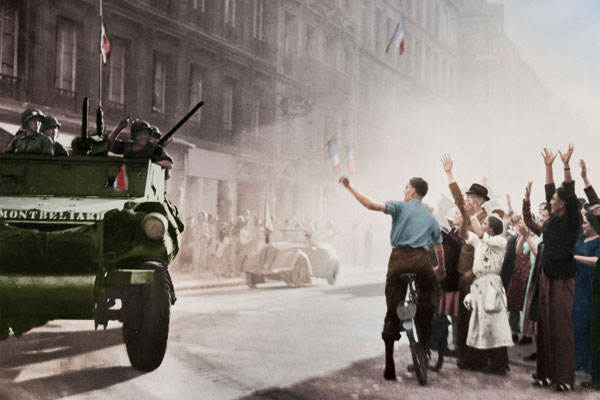It is fair to assume that Professor Matthew Cobb has often been asked if he is related to Professor Richard Cobb since he begins the acknowledgements of his new book by announcing that he is not. Richard Cobb wrote books about France — where he was known as l’étonnant Cobb and, according to his obituary in the Independent, ‘once greeted the dawn nude, in the company of a dozen similarly unattired men and women, in the fountains of the Place de la Concorde’ — and he had a son called Matthew; and Matthew Cobb’s father was called Richard, so the question is understandable. It must also be annoying, though, because Richard Cobb was such a stylish writer, while Matthew Cobb is less so.
Still, Eleven Days in August provides the fullest account imaginable of the Battle for Paris, which not only liberated the city but also determined the political future of France. Cobb draws on a vast array of sources — including material from French and American archives, and the journals and letters of Resistance fighters, collaborators, Allied and German military personnel and all sorts of Parisians — to give an exhaustive, hour-by-hour account of the hectic and momentous days of 15–26 August 1944.
Besides the Germans, who had marched into the city on 14 June 1940 without a shot being fired, the main players were the Resistance, General de Gaulle’s Free French, the fascist paramilitary Milice, the collaborationist politicians, the Allies, and the citizens of Paris.
The Resistance continued to fight the Germans, and was close to the communists, while the Free French were entirely dependent on the Allies, and wanted to wait for them to arrive, but were at the same time at odds with them, since after D-Day in June 1944 they planned to set up an Allied Military Government. De Gaulle enjoyed wide support in France, but the political elite was entirely behind Pétain’s collaborationist government, while many traditional Catholic nationalists, who feared communists and Jews, were what Cobb calls ‘passive collaborators … a kind of human dust that could be blown away by events if the wind of history was strong enough’.
When the Allies landed on the French Mediterranean coast on 15 August, the police in Paris went on strike, the Métro was closed and the uprising began. On the same day more than 2,200 Resistance prisoners were herded on to the quai aux bestiaux (cattle platform) at Pantin goods station, locked into cattle wagons and sent east to the concentration camps.
The chaos and confusion of the succeeding days are reflected in Cobb’s narrative, which hurtles along, illuminated by blazing details. A horse, for example, hit by a stray bullet, fell dead on the Avenue Montaigne and was immediately chopped up by the starving populace. Or ‘a cheery-looking bald man in his mid-sixties’ was walking his dog on the Champs-Elysées when a burst of gunfire killed a woman and he was swept by a crowd into the foyer of the Marigny theatre — P.G. Wodehouse, resident at the Hôtel Bristol. ‘It was all very exciting,’ he wrote to a friend, ‘but no good to me from a writing point of view.’
There are many moments of intense emotion, as when the barricades go up on the 22nd, or when the Free French 2nd Armoured Division arrives on the 24th, its tanks covered in flags and women, the crowds jumping up and down, shouting and weeping for joy. The great bell of Nôtre Dame, silent throughout the Occupation, began to toll, to be joined by church bells all over Paris.
General Dietrich von Choltitz, the military commander who ignored Hitler’s orders to reduce the city to ‘a heap of rubble’, heard the bells from his headquarters at the Hôtel Meurice, where he and his staff were ‘morosely’ drinking champagne and marking the anniversary of the St Bartholomew’s Day massacre of 24 August 1572.
After a dinner of two potatoes, Simone de Beauvoir went down to the Carrefour Montparnasse:
The guns fired, all the bells of Paris began to peal, and every house was lit up. Someone kindled a bonfire in the middle of the road; we all joined hands and danced around it, singing.
There are moments, too, of ignominy, when terror reigned and women accused of collaboration were stripped and shaved in the streets. On 25 August Max and Madeleine Goa, résistants who had sheltered Allied airmen, were on the balcony of their apartment on the Avenue d’Italie when shots were heard. The mob below, convinced that they were snipers, barged into their flat and took them down to the street, where Max was run over by a tank. Madeleine was locked up in an unofficial prison at the Institut Dentaire, where she went mad and was murdered.
This book makes an admirable literary companion, on an epic scale, to La Libération de Paris, the short documentary film by the Resisistance propaganda unit, which was released on 1 September 1944 and may be seen on Cobb’s excellent website, elevendaysinaugust.com.






Comments